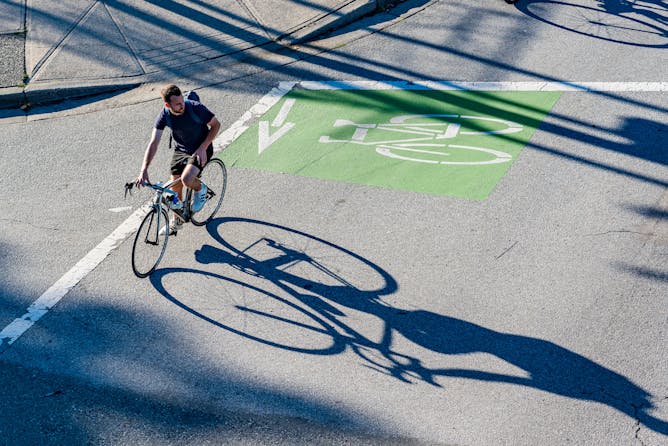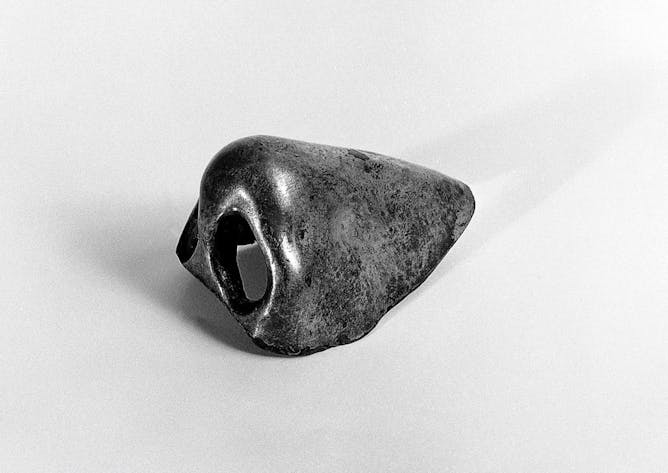|
|
|
|
Lockdowns are loosening in the UK, but tightening up across much of Europe. Researchers meanwhile, have begun thinking about what the long-term impacts of this pandemic might be on societies. Among the leading figures considering this question are Hetan Shah, chief executive of the British Academy, Sir Geoff Mulgan, professor of collective intelligence, public policy and social innovation at UCL, and Deirdre Hennan, professor of social policy at Ulster University. Today they join Jo Adetunji, managing editor of The Conversation in the UK, for a live webinar in partnership with the International Public Policy Observatory. It is free to watch from 2pm BST on Facebook, YouTube and on Twitter. No registration is needed.
One shift seen during the past year in many locked down societies has been towards “active transport” such as walking and cycling. Nearly half of the fall in daily carbon emissions during global lockdowns in 2020 came from reductions in transport emissions, writes Christian Brand, an associate professor of transport at Oxford University. Brand also discovered that bikes were 30 times better on emissions than fossil fuel cars – and ten times
better than electric ones. Whereas electric cars are still quite expensive and carry their own carbon baggage, he argues that bikes and other forms of active travel, such as walking and e-biking, are the best bet for leading the first leg in the race to create net-zero
cities.
Today, we also bring you a fascinating long read on a Renaissance nose job and a report on the new CCTV technology being deployed in a bid to make Britain’s streets safer.
|
Stephen Khan
Executive Editor, The Conversation International
|

|
|

Michael Wheatley/Alamy Stock Photo
Christian Brand, University of Oxford
Active travel can help tackle the climate crisis earlier than electric vehicles – even if you swap the car for a bike for just one trip a day.
|

© Wellcome Collection
Alanna Skuse, University of Reading
Though Renaissance concerns about 'borrowed flesh' might seem outlandish and out of date, they are surprisingly relevant to the modern surgical landscape.
|

CCTV technology has evolved in the decades since it was first introduced.
Orso/Shutterstock
William Webster, University of Stirling
The CCTV ecosystem is evolving – but it's still a sparse patchwork with limited efficacy in reducing or prosecuting crime.
|
Politics + Society
|
-
Chris Allen, University of Leicester
The government's definition of extremism falls short of what's needed, but new definitions could make things more complicated
-
Ailish Saker, University of Oxford
Discussions have rightly focused on the failings of authorities and clubs. But the role of the law should also be examined.
-
Natasha Kuhrt, King's College London
They are hardly 'new best friends', but China and Russia have plenty of common interests – and pressure points.
-
Adrian Favero, University of Birmingham
Switzerland is a key case study for understanding how a global health crisis affects the stability of well-established democratic institutions and shifts political debates.
|
|
Health + Medicine
|
-
Margot Kuylen, University of Essex; Wayne Martin, University of Essex
Have 'Do Not Attempt CPR' orders been misused under the pressures of the pandemic?
-
Connor Bamford, Queen's University Belfast
Ebola seems to be able to lay dormant in people for many years before causing disease again.
-
Valentina Di Pietro, University of Birmingham; Antonio Belli, University of Birmingham
Our research, conducted on elite rugby players, may someday mean concussions can be diagnosed right on the pitch.
|
|
Science + Technology
|
-
Daniel Kelly, Sheffield Hallam University
A growing online movement believes that giving up masturbation can make us happier and boost our testosterone levels.
-
Rami Qahwaji, University of Bradford
Satellites, space stations and astronauts, aviation, GPS, power grids and more can be affected.
|
|
|
|
| |
Featured events
|

|
King's College, Aberdeen, Aberdeenshire, AB24 3FX, United Kingdom of Great Britain and Northern Ireland — University of Aberdeen
|

|
Virtual, York, York, YO10 5DD, United Kingdom of Great Britain and Northern Ireland — University of York
|

|
Online, Online, Oxfordshire, Online, United Kingdom of Great Britain and Northern Ireland — University of Oxford
|

|
Aston University, Aston Triangle, Birmingham, Birmingham, B4 7ET, United Kingdom of Great Britain and Northern Ireland — Aston University
|
|
|
|
| |
| |
| |
| |
| |
|
|
|
|
|
|
|